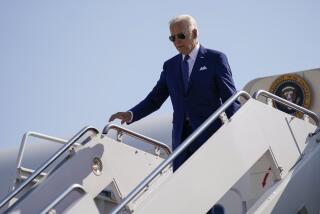The U.S. mission in Afghanistan: Clear enough for you?
In my Sunday column, I complained that the Senate’s one-day confirmation hearing for former Sen. Chuck Hagel, President Obama’s nominee for secretary of Defense, barely touched on the war in Afghanistan, where 66,000 Americans are still risking their lives for a mission that no longer seems clear.
As far as the Senate was concerned, it sounded as if the war was already over. And that’s pretty much how Hagel described it as well.
“We have a plan in place to transition out of Afghanistan, continue bringing our troops home and end the war,” he said.
Only the war won’t be over, I noted. Even if most U.S. troops come home on schedule by the end of 2014, the Afghan army and police forces will still be fighting the Taliban – and some Americans will still be there.
Yes, the Obama White House has talked about a “zero option,” the idea of pulling out completely. But that’s mostly been a negotiation ploy – something that was implicitly confirmed on Sunday by the chairman of the joint chiefs of staff, Army Gen. Martin E. Dempsey.
“No one has ever suggested zero to me,” he said on CNN’s Sunday show, “State of the Union.” If zero were a serious option, Dempsey would be working on a plan to implement it.
Dempsey said he hasn’t settled on the right number for a long-term U.S. troop commitment to Afghanistan, but he said he believes it “can be modest.”
“The ultimate number will be based on the mission and how deeply we want to be involved with their continued development, and also what they” – the Afghans – “want,” he said.
Exactly. But what’s the mission, exactly? It was nice to hear Dempsey and his boss, Defense Secretary Leon E. Panetta, make it clear that the number of U.S. troops in Afghanistan can only be determined once their purpose is clarified. But they didn’t quite make the mission a whole lot clearer.
“The missions that we’ve accepted post-’14 … largely relate to a counter-terror mission, continuing to keep pressure on transnational global terrorism, as well as the continued development of the Afghan security forces,” Dempsey said. That’s pretty broad.
“The mission in Afghanistan is to establish a secure and capable Afghanistan that can govern itself and ensure that Al Qaeda never again establishes a safe haven in that country,” Panetta said on NBC’s “Meet the Press.” That’s a little clearer – but still not clear enough.
ALSO:
McManus: What’s the Afghanistan mission?
Chuck Hagel, an antiwar secretary of Defense
Afghanistan’s new generation: Modern, ambitious ... naive?
More to Read
A cure for the common opinion
Get thought-provoking perspectives with our weekly newsletter.
You may occasionally receive promotional content from the Los Angeles Times.






